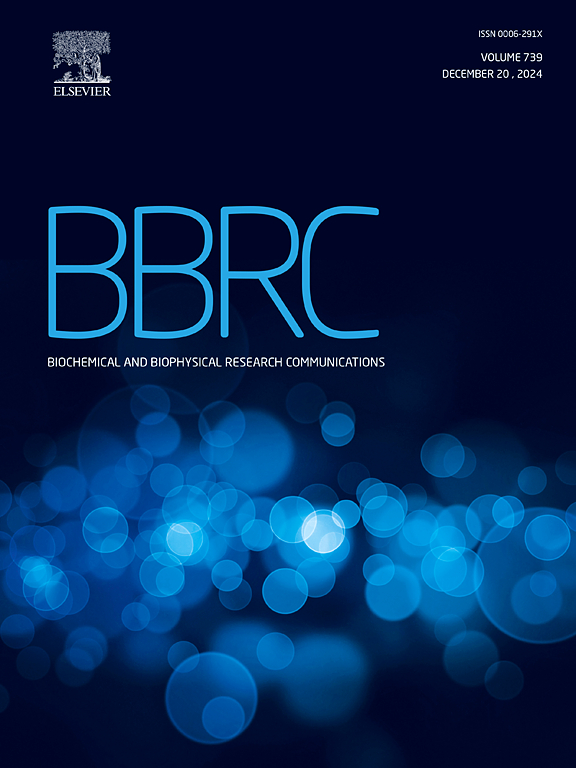睾丸激素抑制是否保留睾丸:对小鼠行为的影响,包括情绪状态、运动活动、社会互动、认知功能和性行为
IF 2.2
3区 生物学
Q3 BIOCHEMISTRY & MOLECULAR BIOLOGY
Biochemical and biophysical research communications
Pub Date : 2025-06-16
DOI:10.1016/j.bbrc.2025.152187
引用次数: 0
摘要
雄激素的沉积显著影响牲畜的肉质,然而传统的手术阉割方法涉及睾丸切除,由于它们与压力和行为改变有关,引起了对动物福利的担忧。为了解决这些问题,本研究比较了两种方法——手术阉割(睾丸切除)和免疫阉割(保留睾丸组织)——以评估它们对小鼠在性行为、情绪调节、运动活动、社会互动和记忆表现等领域的心理和行为影响。结果表明,手术阉割引起了强烈的抑郁样症状,包括动机降低和社会参与受损,而免疫阉割小鼠表现出正常的情绪和社会行为,没有抑郁或痛苦的迹象。这些发现突出了手术阉割的心理负担,并强调了其使用的伦理意义。免疫阉割作为一种更人道的选择出现了,它有效地控制了性行为,而不会引起类似抑郁的症状,可能是通过保护动物的正常感和尊严。这项研究强调了在牲畜管理中平衡生产力与伦理考虑的重要性,并为推进福利友好型阉割方法提供了有价值的见解。通过提倡免疫阉割,本研究有助于提高动物福利标准,同时保持肉类质量,为传统做法提供了一个有希望的替代方案。本文章由计算机程序翻译,如有差异,请以英文原文为准。
Testosterone suppression with or without testicular Preservation: Impact on mouse behavior, including emotional state, locomotor activity, social interaction, cognitive function, and sexual behavior
The deposition of androgens significantly influences livestock meat quality, yet traditional surgical castration methods involving testicular removal raise concerns about animal welfare due to their association with stress and behavioral changes. To address these issues, this study compared two approaches—surgical castration (testicular removal) and immunocastration (retention of testicular tissue)—to evaluate their psychological and behavioral impacts in mice across domains such as sexual behavior, emotional regulation, locomotor activity, social interaction, and memory performance. Results demonstrated that surgical castration induced robust depressive-like symptoms, including reduced motivation and impaired social engagement, whereas immunocastrated mice exhibited normal emotional and social behaviors without signs of depression or distress. These findings highlight the psychological burden of surgical castration and underscore the ethical implications of its use. Immunocastration emerges as a more humane alternative, effectively controlling sexual behavior without inducing depressive-like symptoms, likely by preserving the animals' sense of normalcy and dignity. This study emphasizes the importance of balancing productivity with ethical considerations in livestock management and provides valuable insights for advancing welfare-friendly castration methods. By advocating for immunocastration, this research contributes to improving animal welfare standards while maintaining meat quality, offering a promising alternative to traditional practices.
求助全文
通过发布文献求助,成功后即可免费获取论文全文。
去求助
来源期刊
CiteScore
6.10
自引率
0.00%
发文量
1400
审稿时长
14 days
期刊介绍:
Biochemical and Biophysical Research Communications is the premier international journal devoted to the very rapid dissemination of timely and significant experimental results in diverse fields of biological research. The development of the "Breakthroughs and Views" section brings the minireview format to the journal, and issues often contain collections of special interest manuscripts. BBRC is published weekly (52 issues/year).Research Areas now include: Biochemistry; biophysics; cell biology; developmental biology; immunology
; molecular biology; neurobiology; plant biology and proteomics

 求助内容:
求助内容: 应助结果提醒方式:
应助结果提醒方式:


